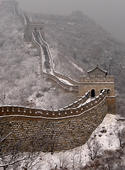The evolution of cities is a protean process--and never more so than now. With over 50% of people living in metropolitan areas there have never been so many rapidly rising urban areas--or so many declining ones.
Our list of the cities of the future does not focus on established global centers like New York, London, Paris, Hong Kong or Tokyo , which have dominated urban rankings for a generation. We have also passed over cities that have achieved prominence in the past 20 years such as Seoul, Shanghai, Singapore, Beijing, Delhi, Sydney, Toronto, Houston and Dallas-Fort Worth. read more »





















